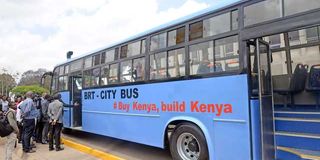Years later, plans for city buses turn into comedy of errors

A bus designed by Isuzu East Africa for the Bus Rapid Transit system is unveiled in Nairobi on October 15, 2018. PHOTO | FILE | NATION MEDIA GROUP
What you need to know:
- Initially, the reason for wanting to bring the vehicles from South Africa was that the local firms had not met the specifications given by the ministry.
The Sh.5.8 billion tender to construct the infrastructure for BRT was awarded to a Chinese firm, Stecol Corporation, two weeks ago.
Until the recent announcement that the government had finally decided to withdraw altogether from the planned Sh1.64 billion purchase of high capacity buses for use in the Bus Rapid Transit (BRT) system, the only constant thing about the project has been the shifting narrative.
Launched in April 2018 with the marking of lanes along the Thika superhighway, the message from the Transport ministry has kept evolving from the buses arriving in a matter of days, to sourcing them from South Africa and later from both foreign firms and locally and to the uncertainty over who was going to run the buses.
Officials even went as far as visiting South Africa and posing for pictures with buses that were reportedly almost ready to be delivered to Nairobi
In January 2019, Transport Cabinet Secretary James Macharia was promising that the buses would be in the country the following month. "We have made progress on bus rapid transport and have agreed with key stakeholders on their roll-out, which is expected later in February," Mr Macharia said on January 28 as he also announced the concept of car-free days in Nairobi.
NO CLARITY
When February arrived, there was no clarity as to when the buses would arrive. February was when the CS had promised the first batch of the buses would have arrived.
This time, however, his PS Charles Hinga said procurement for the vehicles was still ongoing in South Africa. “The procurement process is ongoing, you will be furnished with all the information when the process is complete,” he said. This time there were no timelines given.
By June 2019, when the buses ought to have been on the road, the narrative changed from the arrival of the 64 high-capacity buses to the Transport ministry setting up a special company to operate the buses. “We are forming a special company to run and manage the buses. All stakeholders will be represented,” Mr Macharia was then quoted saying on June 11, 2019.
At that time also, instead of all the 64 buses being bought from South Africa, only 32 were reportedly being imported while the other half were to be procured locally. This followed protests by local companies who were aggrieved at being overlooked for the lucrative tender.
Several days later, there were media reports that instead of importing the vehicles from South Africa, now preference was to be given to local firms to supply the buses. “We are committed to engaging local manufacturing and assembling capacity in provision of these buses and pushing for policies that encourage private sector-led investments in the automotive and transport sectors. We have no intention or desire to import these buses from South Africa,” Mr Macharia said.
“As government, we have a duty to support the local manufacturing industry — so it will be impractical to fly these buses from South Africa yet they can be assembled locally,” he said.
LOCAL FIRMS
Initially, the reason for wanting to bring the vehicles from South Africa was that the local firms had not met the specifications given by the ministry.
In September 2019 when the buses ought to have been on the roads for some seven months, the Cabinet secretary told Parliament that the Ministry of Transport was planning to construct a Sh5.8 billion special lane for high-capacity buses along Thika Road comprising a station, four-foot bridges as well as a park and ride facility.
It suggests that the much-hyped BRT was a cart-before-horse move as the city was ill-prepared to roll out the system without the necessary infrastructure on the targeted roads.
The Sh.5.8 billion tender to construct the infrastructure for BRT was awarded to a Chinese firm, Stecol Corporation, two weeks ago.
No sooner had the government signed the contract with Stecol than Mr Hinga said it had withdrawn from the planned purchase of the BRT buses. In withdrawing, Mr Hinga told the Nation that the government had not paid for the buses that had already been branded in South Africa and was pulling out of the plan due to budgetary constraints.
“The buses had not been paid for. We were in the process of negotiating for them as the government planned to buy the first buses for the pilot phase to provide leadership in the new public transport model. We ran into budget constraints and will be engaging the private sector to purchase the buses as we focus on infrastructure,” PS Hinga said.
BRT was a product of the 2012 urban transport strategy to enhance public transport by prioritising the development of the Mass Rapid Transit System (MRTS).
President Uhuru Kenyatta launched the BRT project in 2015, though there was little movement in actualising it with the government citing budgetary constraints.





